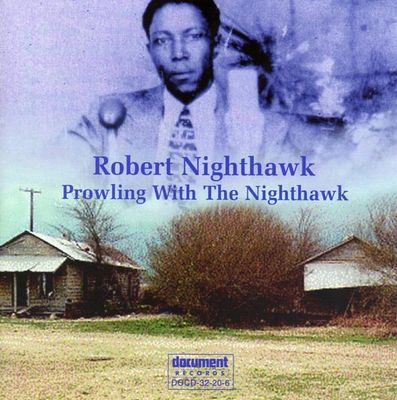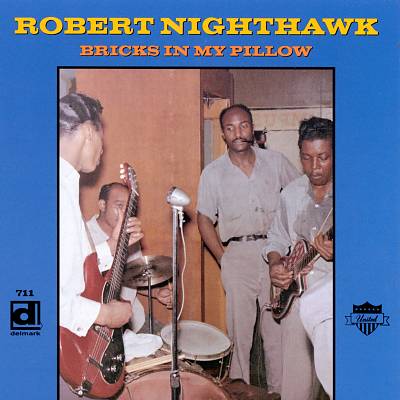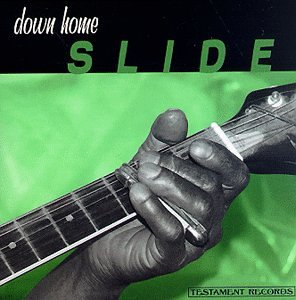Robert Lee Mac Collum
b. November 30th, 1909 in Helena (Arkansas)
b. November 5th, 1967 in Helena (Arkansas)


PROWLING WITH THE NIGHTHAWK
Document
RAMBLIN' BOB
Saga
May 1937 - June 1940 / September 1948 - October 1952
Fils de Ned et Mattie Mac Collum, il quitte le foyer familial assez jeune pour devenir musicien itinérant. Robert parcourt l'état du Mississippi et rejoint Memphis (où il semble travailler avec le Memphis Jug Band). A la fin des années 20, il fait la connaissance de Houston Stackhouse qui aura une énorme influence sur lui (en particulier sur son jeu au bottleneck). Puis, il s'établit à Saint Louis sous le nom de Robert Lee Mac Coy (le nom de sa mère) entre 1935 et 1939. Robert se lie avec les musiciens de la ville : Big Joe Williams, Walter Davis, Henry Townsend et John Lee "Sonny Boy" Williamson. Ces musiciens se retrouvent ensemble à Aurora (Illinois) pour le compte de la firme Victor-Bluebird en mai 1937 puis en novembre - décembre de la même année. On remarque alors ce superbe guitariste au toucher délicat et au jeu de bottleneck soigné : "Tough luck", "Ol' Mose", "Lonesome world", "Prowling Nighthawk". Malheureusement, ces fantastiques séances n'apportent aucune notoriété à Robert qui continue son métier de musicien itinérant. A part un morceau en 1940 ("Friar's Point"), il doit attendre la fin des années 40 pour entrer à nouveau en studio. Il refait donc surface en 1948 à Chicago sous le nom de Robert Nighthawk enregistrant pour Aristocrat (qui devient Chess peu après). Malgré la qualité remarquable de sa musique, il reste dans l'ombre de Muddy Waters et n'est pas promu comme il devrait. Pourtant, son style influencé par Tampa Red accouche de nombreux chefs d'oeuvre comme "Annie Lee" ou "Black angel blues". Parmi les recueils consacrés à la première oeuvre de Robert Nighthawk, "Prowling with the Nighthawk" (Document) et "Ramblin' Bob" (Saga) sont très complets et faciles à trouver.
Son of Ned and Mattie Mac Collum, he left the family home at a young age to become itinerant musician. Robert travels through the state of Mississippi and joined Memphis (where he seems to work with the Memphis Jug Band). In the late 20's, he met Houston Stackhouse who had a huge influence on him (especially on his bottleneck playing). Then he settled in Saint Louis under the name Robert Lee Mac Coy (his mother's name) between 1935 and 1939. Robert binds with the musicians of the city : Big Joe Williams, Walter Davis, Henry Townsend and John Lee "Sonny Boy" Williamson. These musicians come together in Aurora (Illinois) on behalf of Victor-Bluebird firm in may 1937 and then in november - december of the same year. We then noticed this superb guitarist with a delicate bottleneck playing : "Tough luck", "Ol' Mose", "Lonesome world", "Prowling Nighthawk". Unfortunately, those sessions bring no notoriety and Robert continues his itinerant music profession. Besides a track in 1940 ("Friar's Point"), he must wait until the end of the 40's to enter the studio again. So he resurfaced in 1948 in Chicago under the name of Robert Nighthawk to record for Aristocrat (becomes Chess shortly after). Despite the remarkable quality of his music, he remains in the shadow of Muddy Waters and is not promoted as he should. Nevertheless, his style influenced by Tampa Red give birth to numerous masterpieces like "Annie Lee" or "Black angel blues". Among the collections devoted to the early work of Robert Nighthawk, "Prowling with the Nighthawk" (Document) and "Ramblin' Bob" (Saga) are very comprehensive and easy to find.




BLACK ANGEL BLUES
Chess
P-Vine
Charly
Atlas
September 1948 - January 1950 / June 1964
Entouré de musiciens hors-pair (Ernest Lane, Pinetop Perkins, Willie Dixon), Robert Nighthawk grave une poignée de faces pour Chess - Aristocrat entre septembre 1948 et janvier 1950 lors de trois sessions. Il y crée un son de guitare délicat et enveloppant qui influencera de nombreux guitaristes (notamment Earl Hooker). Ses morceaux sont souvent remarquables : "Sweet black angel" (qu'il reprend à Tampa Red), "She knows how to love a man", "Annie Lee blues", "Good news", "Six Three O". Le chant est parfois assuré par Ethel Mae Brown (sa petite amie de l'époque). Mais, mal promu par Chess qui lui préfère Muddy Waters, Robert reste méconnu du public. Bien plus tard, en juin 1964, il retournera chez Chess pour un unique simple où il est accompagné par Lafayette Leake, Buddy Guy, Big Walter Horton, Clifton James et Jack Meyers ("Sorry my angel", "Someday").
Surrounded by top-notch musicians (Ernest Lane, Pinetop Perkins, Willie Dixon), Robert Nighthawk cut a handful of sides for Chess - Aristocrat between september 1948 and january 1950 in three sessions. There, he created a delicate and wrapping guitar sound that will influence many guitarists (more particularly Earl Hooker). His tracks are often remarkable : "Sweet black angel" (a Tampa Red's composition), "She knows how to love a man", "Annie Lee blues", "Good news", "Six Three O". Singing duties are sometimes provided by Ethel Mae Brown (Nighthawk's girlfriend at the time). But wrongly promoted by Chess which prefers Muddy Waters, Robert remains unknown to the public. Much later, in june 1964, he comes back to Chess for one single in which he is accompanied by Lafayette Leake, Buddy Guy, Big Walter Horton, Clifton James and Jack Meyers ("Sorry my angel", "Someday").


BRICKS IN MY PILLOW
Pearl
Delmark
July 1951 - October 1952
Après son passage chez Chess, Robert enregistre pour le label United (et sa marque States) - dirigé par Leonard Allen - en 1951-52. Derrière lui, les sidemen sont remarquables : Roosevelt Sykes, Bob Call, Ransom Knowling, Jump Jackson. Le groupe propose un Chicago blues électrique percutant et entrainant, d'une finesse extraordinaire. Encore une fois, la slide-guitare de Robert Nighthawk se révèle magnifique. Tous les morceaux sont de formidables chefs d'oeuvre : "The moon is rising", "Crying won't help you", "Maggie Campbell", "Nighthawk boogie", "Kansas City", "Bricks in my pillow" parmi d'autres. Le rare microsillon édité par Pearl est disponible en CD grâce à Delmark. Un album tout à fait indispensable. Toutefois, ces faces ne se vendront pas bien et Robert retourne dans le sud à Helena.
After his time at Chess, Robert recorded for the label United (and its States imprint) - led by Leonard Allen - in 1951-52. Behind him, the sidemen are outstanding : Roosevelt Sykes, Bob Call, Ransom Knowling, Jump Jackson. The band offers a powerful electric Chicago blues and remarkably subtle. Again, the slide-guitar work of Robert Nighthawk is beautiful. All the songs are great masterpieces : "The moon is rising", "Crying won't help you", "Maggie Campbell", "Nighthawk boogie", "Kansas City", "Bricks in my pillow" among others. The rare LP edited by Pearl is available on CD through Delmark. An album really indispensable. However, these sides do not sell well and Robert returned to the south in his hometown Helena.

DOWN HOME SLIDE
Testament
May 1964
En 1963, après plus de dix ans d'absence discographique, Robert est retrouvé à Chicago. Une prestation en public à l'Université de Chicago attire l'attention sur lui. Grâce à Pete Welding et son label Testament, Robert participe alors à quelques séances importantes recueillies sur divers disques. Dans "Down home slide", on retrouve trois morceaux superbes gravés à l'Université de Chicago : "That's all right", "Everything gonna be alright", "Anna Lee". Robert y est entouré de Little Walter (harmonica) et Johnny Young (guitare).
In 1963, after over ten years of discographical absence, Robert is rediscovered in Chicago. A public performance at the University of Chicago draws attention to him. Thanks to Pete Welding and his Testament label, Robert then participated in some important sessions collected on various discs. In "Down home slide", there are three beautiful tracks cut at the University of Chicago : "That's all right", "Everything gonna be alright", "Anna Lee". Robert is backed by Little Walter (harmonica) and Johnny Young (guitar).

DOWN HOME HARP
Testament
May 1964
Dans cette anthologie, on trouve un morceau de Robert Nighthawk ("Sweet little woman") capté lors de la même séance à l'Université de Chicago.
In this anthology, we find one title of Robert Nighthawk ("Sweet little woman") captured at the same performance at the University of Chicago.


MASTERS OF MODERN BLUES vol.4
Testament
May - October 1964
Après une longue absence de plusieurs années, Robert revient à Chicago. Il joue dans les clubs et les bars de la ville ainsi que sur le marché de Maxwell Street. Redécouvert par Pete Welding, Robert participe alors à plusieurs séances pour le label Testament en mai et octobre 1964. Derrière Robert, on trouve Johnny Young et Big John Wrencher (un morceau avec Little Walter). En excellente forme, Robert se montre encore impérial à la guitare sur ses morceaux favoris : "Black angel blues", "Maggie Campbell", "Crying won't help you". Un peu moins dense que les faces United / States mais très conséquent quand même. Robert partage ce disque avec son ami Houston Stackhouse. D'ailleurs, sur la partie consacrée à Stackhouse - gravée en aout 1967 - Robert est présent à la guitare aux côtés du batteur James "Peck" Curtis.
After a long absence of several years, Robert returned to Chicago. He played in clubs and bars in the city and on the Maxwell Street market. Rediscovered by Pete Welding, Robert then participated in several sessions for Testament label in may and october 1964. Behind Robert, we find Johnny Young and Big John Wrencher (a track with Little Walter). In excellent form, Robert is still imperial on guitar on his favorite songs : "Black angel blues", "Maggie Campbell", "Crying won't help you". A little less dense than the United / States sides but still very consistent. Robert shared this record with his friend Houston Stackhouse. Moreover, on the part devoted to Stackhouse - recorded in august 1967 - Robert is present on guitar alongside drummer James "Peck" Curtis.

MODERN CHICAGO BLUES
Testament
October 1964
Cette anthologie contient un autre titre de Robert Nighthawk : l'excellent "Blues before sunrise" issu d'une séance d'octobre 1964 ("Masters of modern blues").
This anthology contains one other title of Robert Nighthawk : the excellent "Blues before sunrise" from an october 1964 session ("Masters of modern blues").

BOTTLENECK BLUES
Testament
October 1964
Un autre morceau de Robert Nighthawk (provenant de la même séance d'octobre 1964) : une prise alternative de "Crying won't help you".
Another side of Robert Nighthawk (from the same session of october 1964) : an alternate take of "Crying won't help you".


LIVE ON MAXWELL STREET
Rounder
P-Vine
Bullseye
October 1964
Capté par Norman Dayron dans les rues de Chicago (au coin de la 14ème Rue et de Peoria au niveau du marché de Maxwell Street), nous avons ici un document musical exceptionnel montrant ce qu'était le Chicago blues joué dans la rue (on peut entendre le bruit du public et des voitures). Ce disque mythique fut en fait enregistré pour le documentaire "And this is free" de Mike Shea. Brut, rauque, percutant, puissant, un concentré de Chicago blues comme en témoignent "Cheating and lying blues", "Take it easy baby", le medley "Anna Lee / Sweet black angel" proprement sensationnels. Selon la Blues Discography, Robert est accompagné du jeune harmoniciste Carey Bell mais aussi de John Lee Granderson, "Little" Arthur King, Jimmy Collins. Il reste des incertitudes quant aux participations éventuelles de Johnny Young et Robert Whitehead. Le microsillon initial de Rounder est publié en 1980. Par la suite, Bullseye et P-Vine ont proposé des rééditions CD augmentées. Un disque vraiment unique, obligatoire pour tout amateur de blues.
Captured by Norman Dayron in Chicago's streets (corner of 14th Street and Peoria near the Maxwell Street market), here we have an exceptional musical document showing what is the real Chicago blues played in the street (you can hear the noise of audience and cars). This legendary record was actually recorded for the documentary "And this is free" directed by Mike Shea. Crude, raucous, powerful, a concentrate of Chicago blues particularly obvious on "Cheating and lying blues", "Take it easy baby", the medley "Anna Lee / Sweet black angel" really sensational. According to the Blues Discography, Robert is accompanied by young harmonica player Carey Bell but also by John Lee Granderson, "Little" Arthur King, Jimmy Collins. There are still uncertainties about the possible participation of Johnny Young and Robert Whitehead. The original Rounder LP is published in 1980. Subsequently, Bullseye and P-Vine proposed enhanced CD reissues. A truly unique, mandatory for any blues fan.

AND THIS IS MAXWELL STREET
P-Vine
Rooster
Catfish
October 1964
Les morceaux de Robert Nighthawk repris dans cette superbe anthologie datent de la même performance live sur le marché de Maxwell Street que le disque précédent. On trouve donc ici quelques titres supplémentaires constituant un ajout digne d'interêt (notamment "Dust my broom" avec la participation présumée de Mike Bloomfield).
The songs of Robert Nighthawk included in this wonderful anthology date from the same live performance on the Maxwell Street market than the previous record. So, we find here a few additional titles constituting an addition worthy of interest (including "Dust my broom" with the alleged involvement of Mike Bloomfield).

BLUES SOUTHSIDE CHICAGO
Decca
1964
Recueil de sessions produites par Willie Dixon. Parmi celles-ci, deux morceaux intéressants de Robert Nighthawk dans lesquels il est accompagné d'excellents musiciens (en particulier Big Walter Horton).
Collection of sessions produced by Willie Dixon. Of these, two interesting tracks of Robert Nighthawk in which he is accompanied by some excellent musicians (particularly Big Walter Horton).


30 YEARS OF STONY PLAIN
Stony Plain
35 YEARS OF STONY PLAIN
Stony Plain
1965
De passage à Toronto au Canada, Robert est capté par John Norris accompagné par Bob Woodfork et Jimmy Collins. De cette mystérieuse séance naitront cinq morceaux remarquables qui ne seront édités qu'en 2006 et 2011.
While in Toronto, Canada, Robert is captured by John Norris accompanied by Bob Woodfork and Jimmy Collins. Five remarkable sides will emerge from this mysterious session that will not be issued before 2006 and 2011.


THE GEORGE MITCHELL COLLECTION vol.44
Fat Possum
MISSISSIPPI DELTA BLUES vol.1
Arhoolie
August 1967
A la fin de sa vie, Robert Nighthawk est enregistré par l'ethnomusicologue George Mitchell qui découvrit tant de bluesmen talentueux. Quelques mois avant sa mort, il participe donc à une dernière séance. Déjà malade et diminué, Robert reste toujours impeccable à la guitare aux côtés d'Houston Stackhouse et James "Peck" Curtis. Un peu plus tard, une attaque d'hémiplégie l'affaiblira considérablement. Robert meurt d'un arrêt cardiaque dans sa ville natale d'Helena quelques jours avant son 58ème anniversaire.
At the end of his life, Robert Nighthawk is recorded by the ethnomusicologist George Mitchell who discovered so many talented bluesmen. A few months before his death, he participated to a final session. Already ill and diminished, Robert remains always impeccable on guitar alongside Houston Stackhouse and James "Peck" Curtis. A little later, an hemiplegia attack will let him substantially weaken. Robert died of cardiac arrest in his hometown of Helena a few days before his 58th birthday.